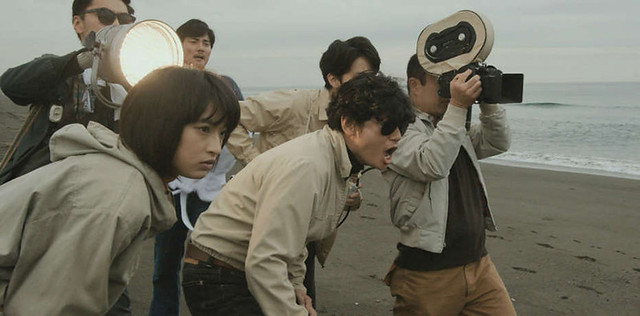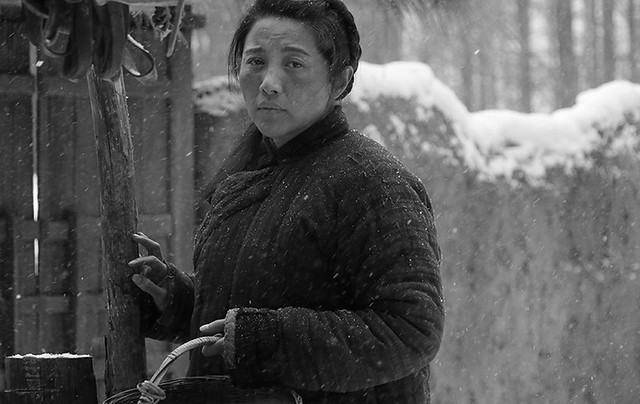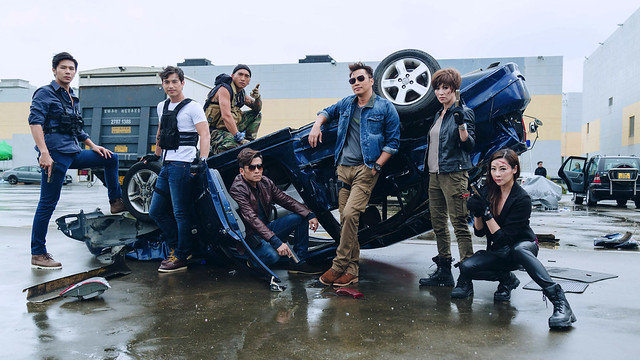This year's program features another extensive survey of East Asian Films, including five international premieres, 23 North American premieres, four U.S. premieres, and eight New York premieres, showcasing the most exciting action, comedy, drama, thriller, romance, horror, and art-house films from East Asia, and bringing close to 30 directors and nine actors from Asia.
The Opening Night is the North American premiere of Bernard Rose’s Samurai Marathon, featuring a star-studded cast and a score by Philip Glass. Eguchi Kan's irreverant action pop comedy The Fable is the Centerpiece.
The Star Asia Lifetime Achievement Award will go to Hong Kong action choreographer and director extraordinaire Yuen Woo-ping and the festival will honor him by screening three films featuring his work: Iron Monkey, The Miracle Fighters and Master Z: Ip Man Legacy.
Here are five films I got to sample:
Samurai Marathon *Opening Night Film*

Samurai Marathon dramatizes a little known fact in Japanese history, where the arrival of Commodore Perry, samurais, and ninja spies all take part in a tale of love, loyalty and tradition at the end of an era. An all-star cast, compelling storytelling and technical craftmanship contribute to the film all the markings of a prestige jidaigeki (period film).
The Annaka clan's feudal lord Itakura (Hasegawa Hiroki) is concerned about the readiness of his men upon hearing about the inevitable prospect of foreign invasion because Japan's been enjoying relative peace for the last 300 years. The brash Commodore Perry (Danny Huston) lands on the Japanese shore and offers the shogunate Western trinkets -- daguerreotype, bourbon and guns -- in the hopes of opening up the isolated country. The year is 1855. So Itakura devises a plan.
He will hold a long distance running contest through the steep slopes and reward the winner with whatever they wish. Jinnai (Satoh Takeru), a ninja sent by the Shogunate to spy on the Annaka clan and currently living as an accountant, is alarmed by the sudden mobilization and mistakenly sends a message to Edo to dispatch the assassins armed with a Colt 45. The rest of the movie is a race against the clock as samurais and foot-soldiers alike make a dash at completing the marathon, then, halfway through, realize the assassins are after their town and the lord, so they have to hastily return to save their town.
Samurai Marathon has plenty of intrigue. For example, Itakura's rebelious daughter, Princess Yuki (Komatsu Nana) joins the race in disguise; and Uesugi (Sometani Shota), a lowly foot-soldier who's known for his speed, will need to compete with Tsujimura (Moriyama Mirai), a spoiled but loyal samurai, for the race. There is Kurita (Takenaka Naoto), a retired old guard who brings much needed humor to the film. And Jinnai's loyalty shifts as he realizes his mistake.
With Phillip Glass' rousing score, Bernard Rose, a British director who is known for his vividly visual films (Candy Man, Paper House) deftly plunges into jidaigeki without losing a beat. Many heads will roll, rice fields will be painted with blood, arrows and ninja stars will fly, and bullets will be fired. Samurai Marathon's got everything you need in a great, enjoyable martial arts film.
Dare to Stop Us

Choosing this title to watch was a no-brainer for me. As a huge fan of Japanese New Wave, Wakamatsu Koji, and his screenwriter and comrade Adachi Masao, I was eager to watch the film. It didn't disappoint. Not only is the film a great reflection of the bustling, energetic Japanese cinema scene of the past that is rarely depicted on screen, it is also an acute observation of a young woman struggling in a male-dominated field.
From the point of view of a 21-year old Shinjuku hippie girl, Shiraishi Kazuya depicts one of the Japanese New Wave greats, Wakamatsu Koji and his gang at the height of their most prolific period, 1969 - 71, which was a socially and politically tumultuous time in Japan.
Megumi (Kadowaki Mugi), a young woman who is still unsure about her place in the world, is a big fan of Wakamatsu's sex- and violence-filled, edgy, politically charged underground films. She wants to be his assistant director because her friend, Spook, happens to be working at the director's tiny production company. Before she gets introduced, Spook warns her that the gig will be tough.
As expected, the notorious director of Embryo Hunts in Secret, I-make-films-that-put-audiences-at-knifepoint Wakamatsu turns out to be a larger than life character. He's loud, egotistical, and always yelling at everyone on set that they are doing a terrible job. Forever donning sunglasses with a cigarette dangling on the side of his mouth, he keeps calling her by wrong names. But Megumi slogs through all the verbal abuses in the predominantly masculine film set culture.
First, her main duty is getting actresses who can pass for High School girls to be in pinku (softcore porn) movies. But over time, her diligence and hard work pay off and she becomes indispensable for Wakamatsu Productions.
In its two-hour running time, Shiraishi manages to make caricatures of these historical figures into well-rounded, likable individuals. He doesn't depict his mentor Wakamatsu as either good or bad, just a human with blemishes like any other. Kadowaki gives a sterling performance as a young woman swept up in exciting, yet dangerous times where certain things were still seen as taboo and frowned upon.
There are many juicy details both behind and on set scenes that will delight the students of that era, including the shooting of Go,Go, The Second Time Virgin on the rooftop from the script from 'that crazy guy Adachi'; Wakamatsu's penchant for making friends with everyone, even the critics and enemies at screenings, bars, and offices; Megumi getting her hands on directing part of Kama Sutra and her first 30 minute pinku film commissioned by love hotel industries; her making advances at the more stoic and gentle Adachi; appearances of studious Oshima Nagisa, Wakamatsu and Adachi's trip to Palestine; and the creation of a traveling screening on a red bus of The Japanese Red Army - PFLP: Declaration of World War, and so forth.
Dare to Stop Us is a sprawling, heady film full of historical and cultural details. It's also beautifully-acted.
Winter After Winter

Xing Jian's Winter After Winter starts with a 20-minute one-take sequence about the Lao family household, as the patriarch Lao Si (Gao Qiang), desperately tries to postpone the immediate forced recruitment of his three sons by the occupying Japanese army. He is determined to keep his family lineage alive by having Kun (Yan Bingyan), his daughter-in-law, impregnated by one of his younger sons before they get taken away (his eldest is impotent).
The second eldest son, Lao Er, runs away in disgust, joining the resistance in the woods; the youngest Lao San, tries but fails and gets taken away along with his older brother. It is 1944 in rural Manchuria.
So starts a formally rigorous, rural miserablist drama. Shot mostly in black and white, Xing has a keen eye for composition and mise-en-scene. The devastating and inhuman effect of the late stage of the Japanese occupation is deeply felt in every character as they try to survive, especially in Kun. Yan's muted performance as a woman quietly suffering from the follies of war and of men is most touching, without being too melodramatic.
The color comes into the picture only after the end of the occupation, but little has changed for these small folks. Their lives are still harsh under the falling snow, and the color remains muted.
Hard-Core

Based on a cult manga Hardcore Heisei Jigoku Bros., this wacky film is a collaboration between director Yamashita Nobuhiro (Linda Linda Linda) and versatile actor Yamada Takayuki (13 Assassins, Milocrorze: A Love Story) who also wears a producer's hat. Its sci-fi tinged, overly complicated storyline doesn't quite capture the aloofness of the comic book nor justifies its two-hour running time, but it has its moments and charm.
It tells a story about Ukon (Yamada), an outcast with a bad temper. He works for an ultra-nationalist nutjob whose goal is to find a shogun's gold buried in a mine so he can re-educate today's youth with the money. Ukon meets hulking, homeless man-child Ushiyama (Arakawa Yoshiyoshi) and feels the fang of kinship.
Things slowly change when they find a robot in the basement of an abandoned chemical factory where Ushiyama sleeps. Ukon's salaryman brother Sakon (Satoh Takeru) wants to make money off of the robot, but Ukon threatens him with violence.
The Robot (Robo-o, Ukon calls him), may not speak, yet it's a sentient being and, when necessary, grabs his friends and flies out of danger. Unfortunately, Robo-o is not the main part of the film.
Not quite as crazy as one would hope from a film featuring a guy in a tin-man suit breakdancing, its multiple plotlines don't help the matter much either. Yamashita's distant approach has its charm, though, and Yamada's semi-serious face is a deadpan comedy delight.
Fatal Raid

No amount of sport bras and flying neck scissor chokes can save this middling Hong Kong actioner fashioned off of Michael Bay-type shoot 'em up visual porn: all shaky cam, discarded shell casings and slow mo fight in the rain kind of stuff.
Fatal Raid involves a raid by an elite HK squad going horribly wrong, resulting in a major friendly fire incident and heavy collateral damage (witnesses are killed), and scarring core members psychologically for life. Twenty years later, the same surviving members are involved in another raid taking place in Macao, now with a new generation of a special force made up of barely distinguishable babe cops.
Things go wrong as they usually do in these movies. They take casualties. And the PTSD comes back on strong to haunt them.




